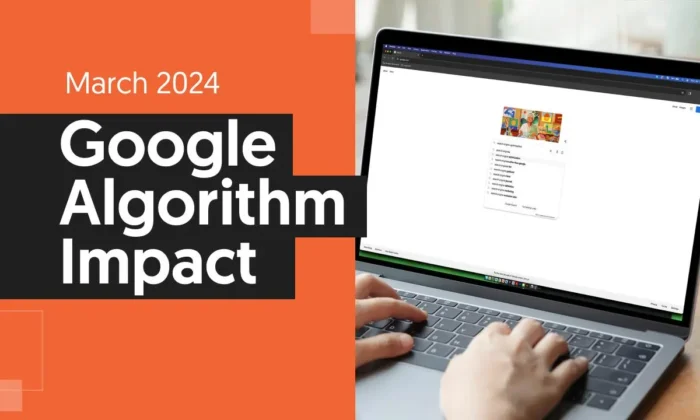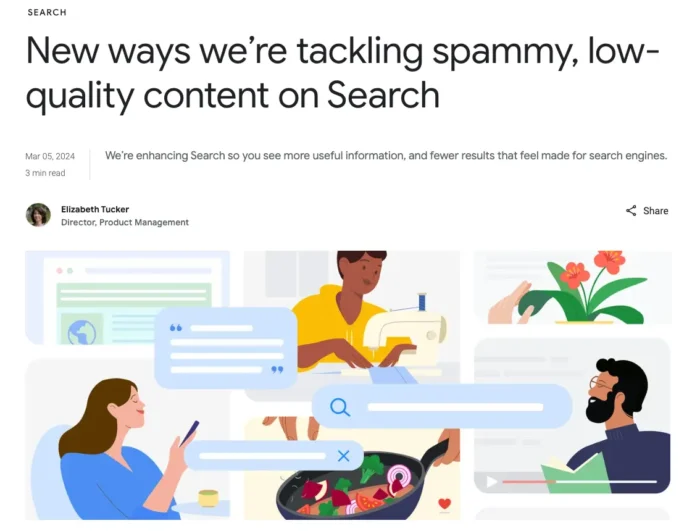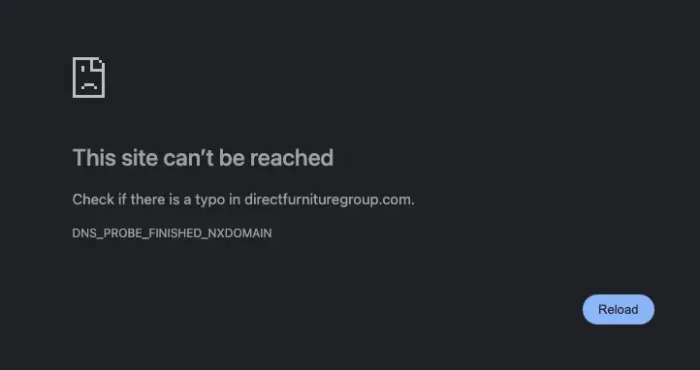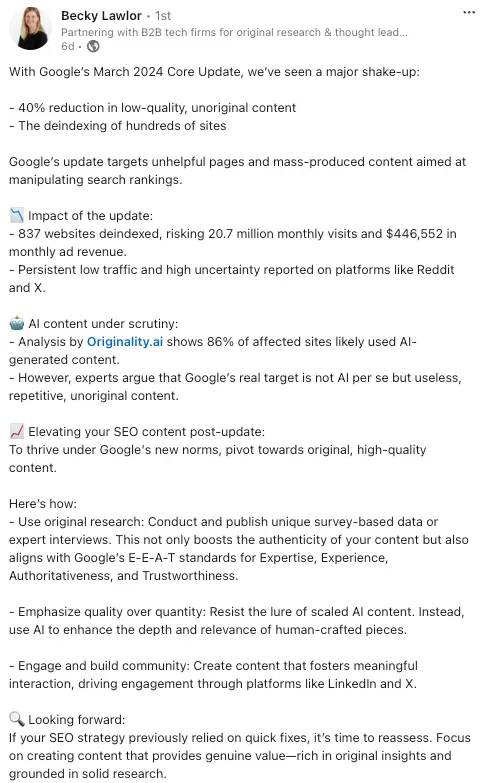

Change is the only constant in digital marketing, and Google’s algorithm updates are a prime example. The latest major shake-up, which started in March 2024 and finished rolling out as of the end of April. has put marketers and webmasters worldwide on high alert. This Core Update specifically targets low-quality content and spam, directly impacting site visibility and performance across the globe.
Have you noticed a decline in organic traffic for your target keywords, or maybe a sudden dip in your site’s performance this month? You’re not alone. In this guide, I’ll take you through the significant impacts of the March 2024 Google Algorithm Update and what these changes mean for your digital strategies.
You’ll learn which sites and tactics were most affected, the new spam policies Google has introduced, and how you can adjust your SEO strategies to recover and excel under these new conditions. Let’s dive deep into this update and unpack its implications for your digital presence.
Key Takeaways
- The March 2024 core update targets low-quality, spammy content. Websites that maintain high-quality, relevant content are less likely to be negatively impacted.
- Google has promised a 45% reduction of unhelpful content.
- Google has tightened its policies against spam and manipulative practices, including harsher penalties for misuse of expired domains, scaled content, and deceptive site reputation tactics.
- Enhancing your site’s Expertise, Experience, Authoritativeness, and Trustworthiness is essential for standing out in search rankings post-update.
- AI can still play a role in content strategy, but it must be integrated carefully and enhanced manually to ensure quality and relevance.
- Ethical SEO practices and regular content audits remain vital to align with Google’s guidelines and secure your site’s credibility and ranking.
What Is the Google March 2024 Core Update?

Source: Google
Every now and then, Google rolls out a Core Update that shifts the digital landscape, and the March 2024 update is pivotal. As Google itself has stated, the update is designed to “ensure we surface the most helpful information on the web and reduce unoriginal content in search results.” This shift is part of Google’s broader effort to fight spam and elevate high-quality content, which directly impacts how websites perform and rank globally. Notable, unlike other core updates, this has enhanced several aspects of the core algorithm as a part of this update. This marks the end of Google announcing future helpful content updates, as these are now going into the core update system.
This particular update focuses on enhancing algorithmic processes to prioritize truly useful and relevant content. It introduces tighter spam policies that clamp down on manipulative tactics and low-quality content. There’s a significant emphasis on curbing scaled content abuse and practices that could tarnish a site’s reputation. Essentially, Google is raising the standard for what it considers quality content, aiming to improve both user experience and the overall integrity of search results. For a more detailed look at the update, you can read Google’s official statement here.
Google’s New Spam Policies
With the March 2024 Core Update, Google has made it clear: the future of search is about rewarding those who produce genuinely helpful content. This is a direct challenge to anyone relying on outdated or spammy tactics to manipulate rankings. The focus is on creating a fair and valuable search environment where quality content gets the visibility it deserves. Let’s dive into these new rules and what they mean for your digital strategy.
1. Expired Domain Abuse
One of the targets of the March 2024 Core Update is the abuse of expired domains. Here’s what happens: savvy (but not necessarily ethical) marketers purchase domains that once had a good reputation or significant traffic.

Instead of building on the legacy of the domain with quality content, they exploit its established credibility to boost search rankings by hosting low-quality, irrelevant content. This manipulative tactic undermines the trust users and search engines have in domain histories. If you’re struggling with domain availability issues or considering purchasing an expired domain, think carefully about the strategy.
2. Scaled Content Abuse
The Core Update also puts a spotlight on scaled content abuse. This is where websites publish massive amounts of content, but not for the right reasons. They use tactics like AI to generate articles, scrape content from other sites, or cobble together pieces of existing content.
The goal? To manipulate search rankings rather than provide real value to users. As tempting as it may be to boost content volume this way, Google is cracking down on these practices. Focus instead on creating meaningful content that resonates with your audience.
3. Site Reputation Abuse
The March 2024 Google Core Update is taking a firm stand against site reputation abuse. This means that if a respected website hosts third-party content that doesn’t match its core mission—think advertorials or guest posts with little oversight—this can mislead users and erode the site’s credibility. For example, imagine a well-regarded educational site that starts featuring payday loan reviews. These articles, likely focused more on SEO than on providing real value, can confuse visitors and diminish the trust built by the site.
Google specifically addresses this issue by pointing out how such practices exploit a site’s strong reputation. For instance, third parties might publish content like payday loan reviews on a trusted educational website to benefit from the site’s search ranking, which can seriously mislead visitors who have different expectations from the site’s content. Under the new guidelines, Google will label this type of manipulative content as spam if it is created primarily for ranking purposes without significant oversight by the website owner.
This crackdown is a clear message: Google is looking to preserve the integrity of search results by ensuring that content on a site aligns with its established reputation and genuinely serves its audience. If you’re managing a site, it’s crucial to vet all third-party content not just for quality but also for relevance and alignment with your primary mission to avoid penalties under the new rules. This will ensure that your site remains a trusted source in Google’s eyes, maintaining your SEO standing and user trust.
The Impact So Far
As with any major update to Google’s search algorithm, the effects of the March 2024 Core Update are gradually coming to light. Several significant impacts are noticeable, especially on websites engaging in particular content practices. Let’s explore what we’ve observed so far:
- Mass Deindexing: One of the most severe actions in this update was the mass deindexing of websites. Google took this step to remove pages entirely from search results, mainly targeting those that violate spam guidelines or contain low-quality content, including sites that leaned too heavily on AI-generated content. This measure underscores Google’s commitment to ensuring that search results maintain high integrity, offering only relevant and trustworthy information.

Source: LinkedIn
- Traffic and Revenue Loss: The direct fallout from deindexing is, naturally, a significant drop in traffic. This reduction in visibility can lead to lower ad revenue and fewer conversions. Websites that were not fully deindexed but had content flagged as low-quality or spammy have also seen traffic declines, reflecting Google’s stricter content quality requirements.
- Shifts in Affiliate Marketing: The update has also sharpened its focus on affiliate marketing practices. Sites that rely heavily on affiliate marketing without adding substantial value to the user experience have been impacted. Google is signaling that simply having affiliate links is not enough—the content around those links must provide genuine value.
William Kammer, VP of SEO at NP Accel, encapsulates this sentiment well, noting that “The March algorithm updates were particularly brutal for specific tactics and websites. While we’re proud that our book of business escaped these algorithm updates relatively unscathed based on the work we provide, we see a different story with websites that rely on copious amounts of low-quality AI content, and affiliate marketing without providing additional value to customers, and websites who were too aggressive with ads on their websites.”
These points illustrate just how serious Google is about promoting high-quality, valuable content and providing a better user experience. If your website has been affected, reviewing your content and SEO strategies is crucial. Focus on creating genuine, helpful content and steer clear of any tactics that might be considered manipulative.
How to Maintain or Improve Your Search Engine Rankings
Maintaining or improving your search engine rankings requires more diligence and smarter strategies than ever before.
Here are some actionable steps you can take to not just adapt but thrive under the new guidelines:
- Quality Content Creation: The foundation of good SEO hasn’t changed—create high-quality, relevant content that directly addresses user intent and provides real value. This type of content naturally earns more engagement and higher rankings.
- Prioritize E-E-A-T Signals: Enhancing your website’s expertise, experience, authoritativeness, and trustworthiness (E-E-A-T) is crucial. To do this effectively, focus on creating comprehensive, well-researched content. Aim for thorough yet concise articles, ideally around 1,200 to 1,500 words, as this range often allows you to cover topics in-depth without filler. This approach builds your brand’s credibility and strengthens your SEO by demonstrating real expertise to Google.

Source: How Long Should Your Blog Articles Be?
- Avoiding Spammy Content and AI Misuse: Keep clear from spammy practices and be cautious when using AI for content creation. Ensure that AI-generated text is thoroughly reviewed and refined to meet high-quality standards.
- Ethical SEO Practices: Embrace ethical SEO techniques that adhere to Google’s guidelines. For example, instead of buying links, focus on creating content that naturally earns links and shares because of its quality and usefulness. Avoid shortcuts that promise quick results but could harm your site’s long-term viability.
- Regular Content Audits and Updates: Keep your content fresh and relevant by conducting regular audits and updates. This sustains your authority and keeps your site in good standing with search engines.
In discussing the importance of genuine content value, William Kammer, VP of SEO at NP Accel, warns against relying too heavily on AI for content production: “Do not assume that AI is a safe way to eliminate the costs of humans writing quality content. If these updates hit you, consider moving into an SEO landscape that provides real value to users, like working on companies that provide real products or services to a location instead of relying on revenue from ads or affiliates where the motives are questionable when Google is considering if a website’s content is useful to users.”
By implementing these strategies, you can ensure your SEO efforts are both effective and ethical, positioning your site for success in a changing digital environment. Focus on the basics and making your content as helpful as possible.
FAQs
What kind of sites were impacted by the March 2024 Algorithm update?
Sites that relied heavily on low-quality, AI-generated content, and those engaging in spammy or manipulative tactics saw the biggest impact. This includes sites with poor E-E-A-T or those involved in deceptive practices like misleading redirects or cloaking.
Should I still use AI in my marketing strategy?
Yes, AI can still be a powerful tool in your marketing strategy, but it must be used wisely. Always ensure AI-generated content is of high quality and provides real value to your users. Reviewing and refining AI content to meet the same standards expected of human-written texts is essential.
{
“@context”: ”
“@type”: “FAQPage”,
“mainEntity”: [
{
“@type”: “Question”,
“name”: “What kind of sites were impacted by the March 2024 Algorithm update?”,
“acceptedAnswer”: {
“@type”: “Answer”,
“text”: “
Sites that relied heavily on low-quality, AI-generated content, and those engaging in spammy or manipulative tactics saw the biggest impact. This includes sites with poor E-E-A-T or those involved in deceptive practices like misleading redirects or cloaking.
”
}
}
, {
“@type”: “Question”,
“name”: “Should I still use AI in my marketing strategy?”,
“acceptedAnswer”: {
“@type”: “Answer”,
“text”: “
Yes, AI can still be a powerful tool in your marketing strategy, but it must be used wisely. Always ensure AI-generated content is of high quality and provides real value to your users. Reviewing and refining AI content to meet the same standards expected of human-written texts is essential.
”
}
}
]
}
Conclusion
As we adapt to the changes from the March 2024 Core Update, remember the core of our approach: deliver value with high-quality content and uphold ethical SEO practices. It’s essential to continually review and possibly adjust your strategies to align with these updates. By doing so, not only do you enhance your current SEO efforts, but you also strengthen your site against future updates.
Prioritizing user experience and content integrity pays off, setting your site up for long-term success in the ever-evolving digital landscape. Keep focusing on these fundamentals, and you’ll build a resilient, reliable online presence.



